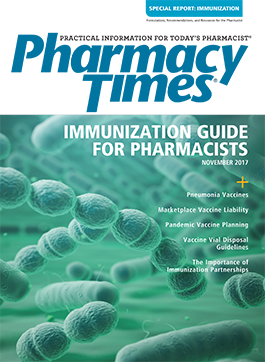Publication
Article
Supplements
Marketplace Vaccine Liability for Manufacturers and Pharmacists
Author(s):
It has been well established that every state allows pharmacists to immunize patients, as long as pharmacists meet the requisite training, have the appropriate certification, and utilize proper recordkeeping.
It has been well established that every state allows pharmacists to immunize patients, as long as pharmacists meet the requisite training, have the appropriate certification, and utilize proper recordkeeping. States are at various stages regarding the minimum age requirements for patients, the types of vaccines pharmacists may administer, and to what extent a pharmacist has independent prescribing authority or, alternatively, whether they must immunize in accordance with a protocol. As with any other grant of professional practice authority, these functions are associated with the risk for liability.
The marketplace for vaccines has grown into a multibillion-dollar industry over the years, accompanied by extensive liability across the spectrum. For example, in the 1970s, a multitude of lawsuits alleging liability against drug manufacturers drove the cost of vaccine manufacturing skyward and even resulted in the temporary suspension of manufacturing vaccines. As a result of these claims, Congress passed the National Childhood Vaccine Injury Act of 1986 (42 USC §§ 300(aa)(1-34),1 signed into law by President Ronald Reagan as part of a larger health care bill, in order to reduce the potential liability of vaccine manufacturers due to injuries associated with vaccine use. The Act established a compensation program. Effectively, a fund was created to allow those who were injured by vaccines to receive compensation derived from an excise tax on each dose. The Act essentially advances a no-fault compensation program and states that manufacturers cannot be held liable for unavoidable, adverse effects.1
Despite the broad efforts of the Act to protect against manufacturer liability in the event of an adverse outcome associated with vaccine administration, lawsuits persisted as plaintiffs continued to find ways to subvert the shield created by the Act. Legal challenges ensued, and by the 1980s, few, if any, companies were engaged in the manufacture of vaccines. Although proponents of the Act believed it would provide a satisfactory defense for manufacturing mishaps, critics maintained that the removal or isolation of manufacturer liability would disincentivize manufacturers from making certain their vaccine products were as safe as possible.
Attacks on drug manufacturers eventually made their way through the federal court system and to the US Supreme Court. The Court rejected initial requests for review of lower court decisions, but eventually ruled in favor of manufacturers in Bruesewitz v Wyeth LLC.2 In a 6-2 opinion led by Justice Antonin Scalia, the Court held that the “plaintiff’s design-defect claims [were] expressly preempted by the Vaccine Act.”2 In so doing, the Court affirmed laws that vaccine manufacturers are not liable for vaccine-induced injury or death if “accompanied by proper directions and warnings.”2
Notwithstanding the legal result in Bruesewitz v Wyeth LLC, legal liability still extends to health care professionals, such as pharmacists, who engage in the administration of vaccines.2 The Bruesewitz v Wyeth LLC case extends to legal protection for vaccine manufacturers but does not shield against alleged liability in which a pharmacist may be complicit.2 To that end, a pharmacist who breaches their duty of care in a causally related manner that results in patient damages would likely be held liable for committing professional malpractice. Pharmacists who improperly administer a vaccine or fail to conform to industry-accepted norms could be found liable. These allegations would be directed to the pharmacist’s administration of the vaccine and not to the product itself.
Commensurate with expanded responsibility on the part of the pharmacist is the likelihood that liability will increase with respect to immunizations. To minimize risks associated with immunizations, pharmacists need to embrace clinical training, continuing education, and an awareness of responsibilities before, during, and after an immunization takes place. Protocols, policies and procedures, and handbooks are helpful guides for adhering to best practices. When implemented appropriately and followed, they may be useful in limiting liability.
Notwithstanding best efforts to prevent a mishap from occurring, pharmacists should ascertain whether their current professional liability coverage extends to patient immunization activities. Practicing pharmacists should ascertain that there is no exclusion or carve-out for patient immunization activities. If one exists, it may be necessary to add the coverage through an additional rider, which would likely involve an additional fee for that coverage. Moreover, employers frequently offer extended legal protection for pharmacist liability. This should also be confirmed to guarantee that appropriate coverage is in place. Ensuring that proper professional practice liability coverage exists, coupled with implementing best clinical practices, should be the cornerstone of mitigating against any alleged liability regarding pharmacist immunization activities.
Unless otherwise attributed, the statements and opinions of this article represent the viewpoints and expertise of the author.
NED MILENKOVICH, PHARMD, JD, is chair of the health care law practice at Much Shelist PC in Chicago and vice chair of the Illinois State Board of Pharmacy. He can be reached at (312) 521-2482 or at [email protected].
References
1. The National Childhood Vaccine Injury Act, 42 USC §§300(aa)(1-34) (1986).
2. Bruesewitz v Wyeth LLC, 562 US 223 (2011).

Newsletter
Stay informed on drug updates, treatment guidelines, and pharmacy practice trends—subscribe to Pharmacy Times for weekly clinical insights.






